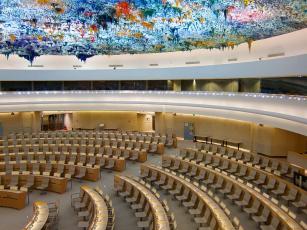Government response to UPR recommendations collated; tools to support NGO engagement
Mon 25 Aug 2014
The New Zealand Government's response to the 155 recommendations made under the United Nations' Universal Periodic Review (UPR) has been collated ...

The New Zealand Government's response to the 155 recommendations made under the United Nations' Universal Periodic Review (UPR) has been collated by UPR Info.
UPR Info is an NGO based in Geneva, Switzerland which aims to raise awareness of the UPR and provide capacity-building tools to the different actors of process, such as United Nations member states, NGOs, national human rights institutions and civil society. It also provides tools to support NGO engagement with the UPR process (see further below).
The list of the New Zealand Government's responses to the recommendations are available on the UPR Info website. It can be read in conjuction with the Government's explanation of its response to the recommendations.
In the area of violence against women and children, the Government stated that it accepted the following recommendations:
"106, 108, 110, 111, 112, 115, 116, 117, 122, 123, 124, 128: New Zealand continues its commitment to end violence against women, and the neglect and abuse of children. There are a number of initiatives underway and further work is being developed.
107, 127: New Zealand provides a programme of action to further address family violence through the Taskforce for Action on Violence within Families. In addition it has developed, and is developing, plans to address targeted areas of violence against women and children.
109: The Cross-Government Review of Specialist Sexual Violence Services is working on integrated approaches to monitoring the performance and evaluating the effectiveness of the sexual violence sector.
114, 120, 125, 126: New Zealand is implementing legislative and policy measures to prevent violence against women and children, including the Family Court Proceedings Reform Bill. New Zealand recognises the importance of collecting accurate data.
118, 119: As part of the cross-Government review, a National Sexual Violence Primary Prevention Strategy has been developed which includes encouraging safe and respectful behaviour. The Government is implementing the Family Court Proceedings Reform Bill, and is committed to developing and promoting consistent policies, training, and messages around sexual violence.
121: Government agencies remain committed to ending gender-based violence. Implementation of these recommendations has been superseded by later work.
129, 130: New Zealand has legislation in place to prevent and sanction forced and underage marriage. Relevant government agencies have agreed to identify and support victims of forced and underage marriage. New Zealand also has legislation in place to prevent and address female genital mutilation."
The Government rejected the recommendation to:
"95: Develop, in partnership with civil society, a national action plan for women with defined targets, to address issues such as violence against women, pay inequality, the situation of Māori and Pacific women, and women with disabilities."
The Government said, "New Zealand has established specific priorities to provide the greatest benefits to women and consequential benefits for New Zealand ... New Zealand monitors both the status of women and the status of the population in general and has identified goals or targets associated with each priority." It also said, "New Zealand is committed to improving in three priority areas: greater economic independence for women, more women in leadership positions, and improving women’s safety from violence."
The Government also rejected the recommendation to:
"113: Enlarge the scope of the White Paper for Vulnerable Children and its Children’s Action Plan by taking into account the relationship between child abuse and contributing factors such as domestic violence and poverty."
The Government said, "The Children’s Action Plan aims to protect vulnerable children from maltreatment. New Zealand has other programmes to address intimate partner violence and child poverty."
UPR-Info also provides access to toolkits for NGOs, including a new Civil Society Follow-up Kit. This provides an explanation to civil society on how to fully engage in the UPR follow-up process. As it notes, this is "the most critical stage of the whole process, as it leads to the actual realisation of the UPR goals." Ways it suggests to follow up on the recommendations include making the outcome of the review public, initiating a dialogue with the State, monitoring the implementation of the recommendations and reporting on the status of the implementation. More detailed information is provided under each of these headings.
UPR-Info also provides access to online tutorials on the history and the roots of the UPR, its rules, methods and main outcomes; and advice on how civil society can engage in the UPR process.
For background information on the review of New Zealand, see previous NZFVC news stories UN concerned about violence against women and children in New Zealand (January 2014) and Govt accepts "vast majority" of UN human rights recommendations (June 2014).
Image: Room XX, Palais des Nations by BriYYZ. Licence: Creative Commons Attribution-Share Alike 2.0 Generic
Image: BriYYZ


